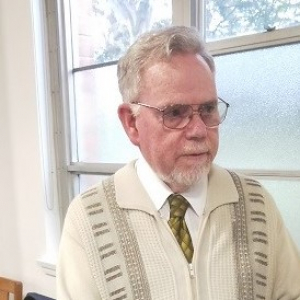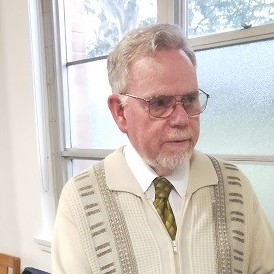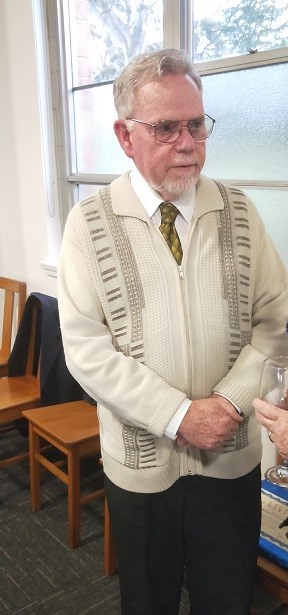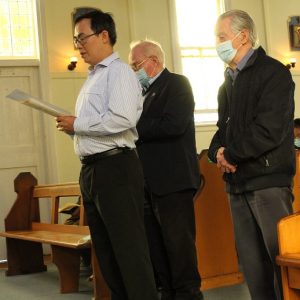Peter MALONE
Congratulations, Bruce Duncan CSsR, Golden Jubilee of Priesthood, former student of Chevalier College.
Congratulations, Bruce Duncan CSsR, Golden Jubilee of Priesthood, former student of Chevalier College.
Bruce Duncan is a student of Chevalier College and a colleague at the Yarra Theological Union.
University of Divinity entry on Bruce Bruce Duncan was ordained for the Redemptorist Congregation, 11th December 1971. To specialise in the areas of social justice, he studied economics and political science at the University of Sydney. During this time he was one of the founding editors of the ecumenical monthly magazine, National Outlook. Since 1986 he has taught at Yarra Theological Union. He was a member of the Melbourne Catholic Commission for Justice, Development and Peace (1994-2007), and a consultant with Catholic Social Services Victoria (1998-2007). He is one of the founders of the advocacy organisation, Social Policy Connections, and previous Director of the Yarra Institute for Religion and Social Policy, which has been subsumed into the Centre for Research on Religion and Social Policy (RASP) within the University of Divinity. At YTU he currently offers courses in
Current research interests
BooksThe Church’s social teaching: from Rerum novarum to 1931. Melbourne: CollinsDove, 1991. Crusade or Conspiracy? Catholics and the Anti-Communist Struggle in Australia. Sydney: UNSW Press, 2001. |
Congratulations, Vincent Phon Phan MSC, First Profession
Congratulations, Vincent Phon Phan MSC, First Profession
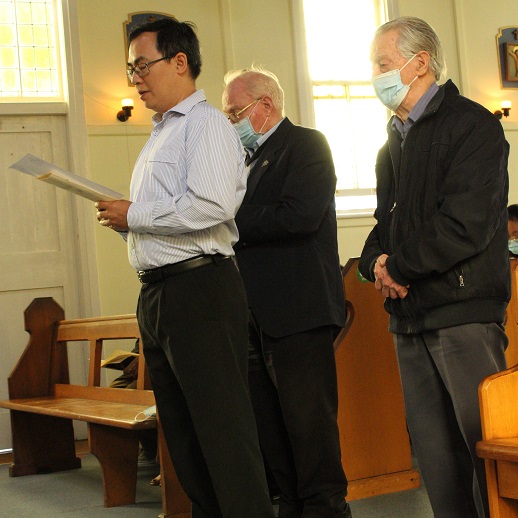
Vincent has made his Novitiate at Douglas Park with Peter Harvey Jackson as Novice Director.
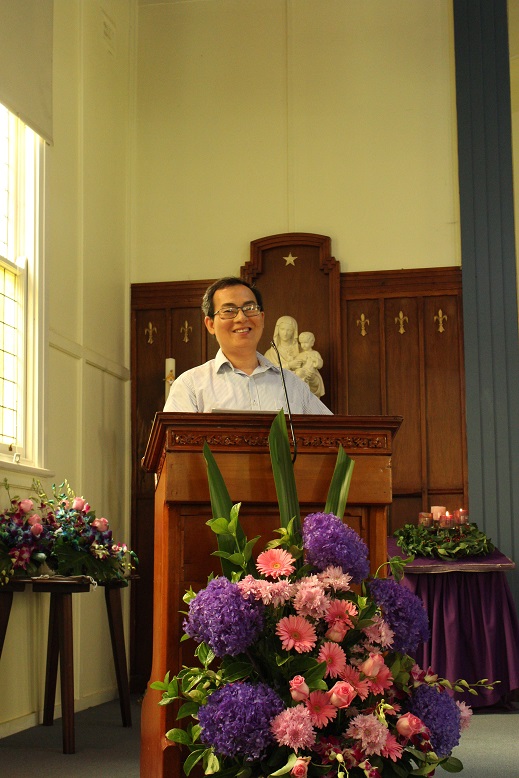
Vincent began his pre-novitiate in Blackburn in January 2020 and almost immediately went into lockdown in Melbourne, one of the longest in the world, and a ministry of Zoom Masses.

Just as Melbourne was emerging, he moved to NSW – and experienced more lockdown during 2021. The Melbourne community welcomes Vincent for 2022 – and freedom to see and get to know the city.

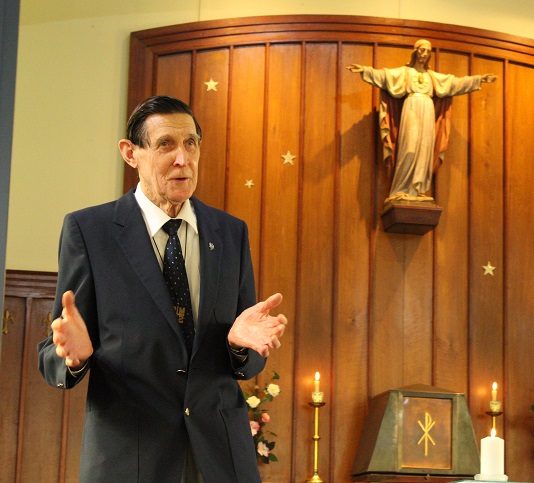
Peter Harvey-Jackson
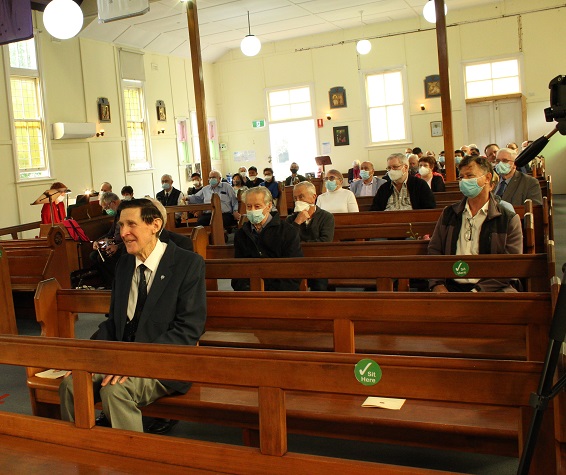
Margaret O'Loughlin reading
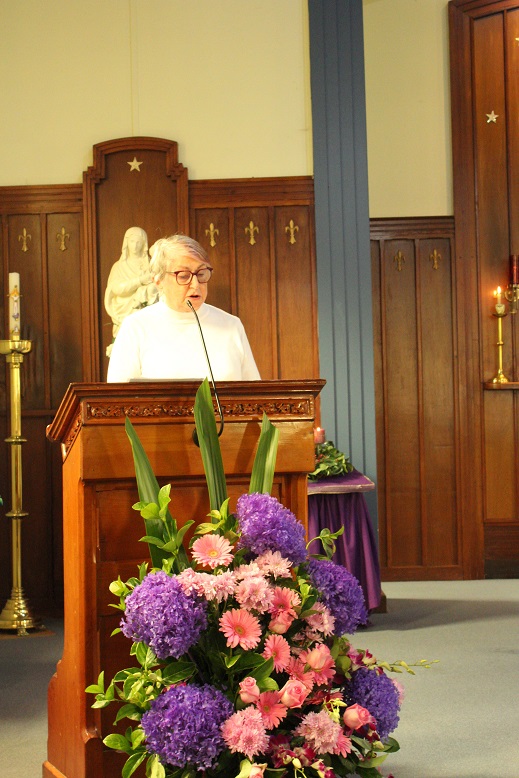
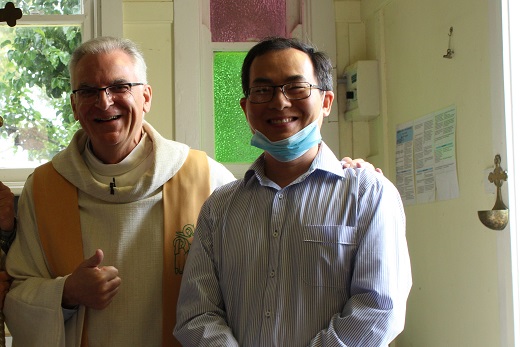
With thanks to Trieu for the photos
Water Man, The
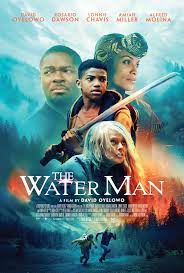
THE WATER MAN
US, 2020, 91 minutes, Colour.
David Oyelowo, Rosario Dawson, Lonnie Chavis, Maria Bello, Amiah Miller, Alfred Molina, Jessica Oyelowo.
Directed by David Oyelowo.
The Water Man combines old-style mythologies, mysterious characters in the woods who have healing powers, with the realism of the Oregon forests. This is the first film to be directed by David Oyelowo.
The focus is on an 11-year-old, Gunner, played effectively by Lonnie Chavis. His mother, Rosario Dawson, is terminally ill. His father, a Marine, played by Oyelowo, is often absent and does not relate well with his son. Gunner is composing his graphic novel, is fond of detective stories, meets of Wunder with blue hair, Jo, Amirah Miller, and persuades her to take him into the forests to meet the legendary Water Man in order to heal his mother.
There are suggestions of Hansel and Gretel in the telling of their journey.
In the meantime, their father is anxious and sets out a search, a huge fire burning on the other side of the forest. However, elements of Gunner’s novel come alive in the search.
Ultimately, the couple are found, a family reconciliation – and the completion of Gunner’s graphic novel.
- A coming-of-age story? A boy aged 11? The blend of reality and fantasy?
- The remote town, homes, the streets, the bookshop, the police station, the contrast with the woods, trees and mountains, waterfalls and rivers, remote huts? The musical score?
- The credibility of the plot? Realism? Fantasy? And wishing that fantasy could be true? The character of the Water Man, the legend in the town, as recounted by Jo, by Jim Bussey with memories of his father, deaths, burials, the gold nugget and survival? Healing capacities?
- The realism of the film’s style? Narrative? The moving into animation, the animation style, the graphic novels? The sketch style for the narrative about The Water Man? The various times moving into animation and the suggestive mood?
- Gunner’s story, aged 11, his father in the Navy, devotion to his mother, her illness and his shock? The sternness and discipline of his father? An imaginative boy, on his scooter, watching the funeral (for research)? His drawings, the story, the Graphic Novel imagination? His father not appreciating it? Accidentally standing on the sketch and ink? Gunner’s thinking his father did not like him?
- His research, the number of books read, going to the bookshop, the advice from the manager? Going to the abandoned building, hearing Jo telling the story, collecting the money from the children? His going to ask her, her financial demands? Agreement? His going to see Jim Bussey, hearing the story of The Water Man?
- Leaving the note for his mother, his father reading it, not telling his wife? The severity of her illness, incapacitated, in bed, medication?
- Gunner, going off with Joe, getting the supplies, disapproving of her stealing? The discussions, out in the woods, coming for the night, the fear of creatures, the insects and Jo’s panic, Gunner going out into the night, the sense of presence, their running, leaving the haversack behind? Jo wanting to turn back, Gunner insistent? Her looking at all his money? Going on, the log across the river, his not being able to swim? Going across, slipping, Jo rescuing him? The continuing? His having the sword, his father’s?
- Going alone, finding the hut, the stones gliding along the way, the encounter with The Water Man, his knowing who Gunner was, their discussions, about his mother? Disappearance?
- His father, upset, searching for his son, getting the help of the police? The confrontation with his wife, going in the vehicle, Jim Bussey giving advice, information from the bookshop, from the supply store? Driving along the ridge, the fires, calling for his son, finding him, finding Joe, protecting them from the fire?
- The reconciliation, the gift of the case of pens for Gunner to sketch?
- The final credits, the Graphic Novel, the adult heroes, Gunner and Jo?
Big Ugly, The
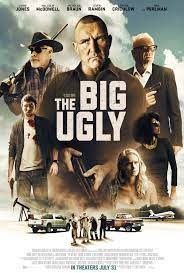
THE BIG UGLY
US, 2020, 106 minutes, Colour.
Vinnie Jones, Malcolm Mc Dowell, Ron Perlman, Nicholas Braun, Leven Rambin, Brandon Sklenar, Lenora Critchlow, Bruce Mc Gill, Dan Buren, David Myers Gregory.
Directed by Scott Wiper.
The title is not deceptive. This is a blokes and blokey film, emphasis on hostilities rather than mateship.
While the setting is the Appalachian mountains, there is a lot of atmosphere of the London criminal.
And here is Vinnie Jones once again, playing a thuggish killer with a philosophical bent. He accompanies his gang boss from London, Malcolm McDowell. The aim is to do a money-laundering deal with a local oil man played by Ron Perlman. So far, so, perhaps, predictable with each of the stars and their swaggering presence.
However, trouble starts with the son of the oil man, Junior, who has his way with the gangster’s girlfriend and kills her. Needless to say, this leads to all kinds of trouble, conflict between the gangsters, the obsessive intentions of Malcolm McDowell, the exasperations of Ron Perlman taught his son. And not everyone surviving!
It leads up to a confrontation between Vinnie Jones and the locals, with one of the foreman trying to keep some kind of peace but brutalised for his efforts.
A macho film for audiences with macho tastes.
- The impact of the title? Attractive? Curious? And who was the Big Ugly? Or the situation?
- The West Virginia settings, Kentucky locations? The remote mountains, the oil drilling site, the town, the bar? The contrast with the jets and the high flyers? The musical score?
- Preston’s story? Ron Perlman? Oil drilling? The authorities – or not? Financial issues? The gradual revelation of the past, in England, marriage, honeymoon, the tragic death of his wife? His son and his spoiling him, permissive about his behaviour and attitudes? The past friendship with Harris, support at the time of his wife’s death? Relying on him for the loan, laundering money? The meetings, the discussions, his personality, working with his men, his friendship with Milt, Milt his loyalty to Preston? Concern about his son? His son’s behaviour, disapproval, yet supporting his son?
- Harris, London crime, wealth, lending the money to Preston, his associates, the girlfriend in the plane and her sexual encounter with Junior and Harris dismissing her as a hooker? His relying on Neelyn, the hitman for many decades, the passenger in the plane, Neelyn shooting him, Milt observing? The return to London?
- Neelyn, a Vinnie Jones character, hitman, tough, lined face? In the entourage, depending on Harris? His relationship with Fiona, genuine tenderness? Her disappearance, his grief, not getting back on the plane? Getting the information, finding her in the river, burying her, his revenge? His age, the fights, his being beaten up, not the triumphant hero?
- Junior, his attitudes, 20s father, finance, the job, towards women? With Harris’s girlfriend? Propositioning Fiona, her death? Will, keeping an eye on him, Will failing, confrontation, Will wanting to give up the job? Will and his attraction to Kara, her work in the bar, friendship with Neelyn, supporting him? Junior and his violence towards Will?
- Milt, keeping some law and order, yet loyal to Preston? Knowing what was going on, observing, following through – and his being killed?
- The workers, bonding, the bar, the manager, giving a sympathetic ear to Neelyn? Kara and her working, needing the job? The workers on the site, the locals and their backwards behaviour?
- Neelyn, meeting Thomas in the bar, giving him the drinks? Thomas and the friendship, the joke about steady hands, keeping an eye for Neelyn, helping him out at the end, helping Will and Kara to escape?
- Harris, to London and back, the confrontation, the hold on Neelyn, Neelyn putting the bag over his head to escape? Harris and the discussion with Preston? The drinks together, friendship, honour, each shooting the other?
- The site, the confrontation with Junior, his taunts, Will and the confrontation and fight, the guns, Will shooting Junior? Neelyn, overpowered, tied up, rescued, the truck, the escape, Thomas and the alternate route?
- Neelyn, his death, some nobility in his hitman life? The young couple and their future?
Sister Cities
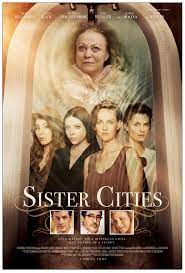
SISTER CITIES
US, 2016, 86 minutes, Colour.
Jacki Weaver, Jess Weixler, Stana Katic, Troian Belisario, Michelle Trachtenberg, Tom Everett Scott, Amy Smart, Kathy Baker, Alfred Molina.
Directed by Sean Hanish.
Sister Cities premiered on the Lifetime channel, a channel that appeals to the widest audience, often the daytime audience.
This is a drama about mother and daughters. The mother is played by Jacki Weaver in our old age, Amy Smart when younger. She is a dancer who has travelled the world, lived an exciting life, has had four daughters from four different fathers and named them after the cities they were born in.
There has been some alienation of the daughters from their mother. One, an author of a single bestseller, as returned home to care for their mother in her old age. The other sisters gather, one from the legal profession, aiming to be a judge, another who tries to be perfect but is in the throes of a divorce, and the youngest daughter.
Coming home offers the opportunity for getting to know each other better. However, it also raises the tensions between the sisters. There are many flashbacks to their mother when younger.
Eventually, the secret is revealed, the mother terminally ill, and assisted suicide. The local police chief, Tom Everett Scott, begins to investigate. Also present is Alfred Molina, father of one of the daughters and the best friend of the mother. The film raises the different perspectives on assisted suicide, personal compassion versus the law – and the devices that the daughters use to conceal what has happened.
A drama, based on a play, which is geared to women’s issues especially, exploration of female characters.
- The title? The four sisters? Their names, names of American cities?
- A drama about assisted suicide? Portrait of the mother, her life, illness, decision? Her reliance on her daughter, Austin? Audience sympathies?
- The action taking place on the property, in the house? The bathroom? The downstairs rooms? The confined action but the focus on the family? The musical score?
- The portrait of Mary Baxter? Young, her husband and his absence, the daughters, her relationships, leaving Carolina to look after the of the children? Older, her illness, confiding in Austin? The pathos of the final bath and conversations with Austin? The range of flashbacks, Mary as young, careless? Mary older, kinder, confiding in Austin? In the flashbacks to her writing the notes to each of her daughters?
- Austin, her career as a novelist, reputation, her new manuscript and the publicist not liking it? Her relationship with the fan? Going to live with her mother, her mother confiding in her, the plan for Austin to phone her sisters? Their arrival? Her mother killing herself, the discovery in the bath? Not so long dead?
- The portrait of the other sisters? Carolina, the oldest, responsibilities in the past, plans to be a judge, her reaction to the others, severe, her drinking? Chief Brady and memories of the past, sternness with him? Her issues of the suicide, ethical, legal? Austin administering the drug, her collapse, revival? More sympathy? Baltimore, freer in her attitudes, discovering the book about suicide? Her moods? Dallas, prim and proper, cleanliness and order? Her divorce? Wanting to call the doctor with Carolina’s collapse? Having to ward off Brady and the doctor?
- Brady, the past, the interviews with the sisters, the inconsistency of their stories? The doctor, the photographs, the verdict of suicide? His discovering the letters?
- The sisters reading their letters, their mother’s love for them despite the past? The finale with the four sisters together – the future?
Fires

Fires
|
o. |
Title |
Directed by |
Written by |
Original air date |
Australia viewers |
|
|
1 |
"Episode 1" |
Belinda Chayko |
26 September 2021 |
354,000 |
||
|
Lighting strikes and starts what is to become a long, hot and treacherous summer for young volunteer firefighters Tash and Mott. |
||||||
|
2 |
"Episode 2" |
3 October 2021 |
295,000 |
|||
|
Dairy farmers Kath and Duncan return to their farm in the aftermath of the fire while grief and blame threaten to tear the family apart. |
||||||
|
3 |
"Episode 3" |
10 October 2021 |
318,000 |
|||
|
Tash and Mott join the local fire-fighting effort in a small beachside community as locals and tourists alike have to make the difficult decision of whether to stay or flee. |
||||||
|
4 |
"Episode 4" |
Steven McGregor & Belinda Chayko |
17 October 2021 |
371,000 |
||
|
On Christmas Eve, Tash and Mott escort locals from a small rural community to a community hall for refuge from the fires. |
||||||
|
5 |
"Episode 5" |
24 October 2021 |
321,000 |
|||
|
The fire fronts join up creating a "megafire". As a wall of flames bear down on Ruth and Nawra defending their home and the wildlife they care for, conflicting priorities at the fire control centre leave them in peril. |
||||||
|
6 |
"Episode 6" |
Belinda Chayko |
31 October 2021 |
304,000 |
||
|
It's New Year's Eve. A usually picturesque holiday town looks like a war zone - as day turns to night, then the sky turns blood-red, people rush to the water's edge for safety. |
||||||
This six part television series is not a continuous narrative. Rather, it is an anthology of stories about bushfires, responses, the human condition, disaster and tragedy. It reflects the huge range of fires that devastated, especially, the eastern states of Australia in 2019-2020. The production is under the auspices of prolific producer, Tony Ayres.
In the first episode there is the introduction to the fires, in Queensland, the voluntary services, and a focus on a young couple and their families, the touch of romance, their working together, Eliza Scanlen and Hunter Page-Lochard. They will reappear in further episodes, moving south with their volunteer work, sometimes heroic, sometimes impetuous, and, ultimately, sad.
The second episode was nominated for all kinds of awards, writing, direction, cinematography, performances, especially of Miranda Otto. This is a tense episode, an older couple, destruction of the house, their wanting news of their sons, the behaviour of their prospective daughter-in-law, tension and clashes. Richard Roxburgh plays the husband, more accommodating, Miranda Otto having the angry outbursts.
In further episodes, there is a focus on a more affluent couple and the threat to their home and their behaviour, Sam Worthington and Anna Torv. There is also the episode with Mark Leonard Winter, unreliable background, getting a lift with a family and guiding them from the South Coast to Canberra, having to take detours, having to control the children, Christmas pending and the family wanting to get home. There is also an intense episode focusing on a shelter, some of those taking refuge, an aboriginal woman, wanting to walk back to her home against advice…
The final episode is on New Years Evil, people taking refuge near the water (memories of boats having to come to Mallacoota to take people away), and a number of the themes of the previous episodes coming together.
The series showed on the ABC and was praised – although, interestingly, on the Internet movie database, there are many adverse and critical comments.
Nos Battailles/ Our Struggles
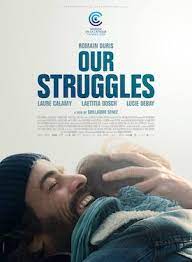
NOS BATTAILES/OUR STRUGGLES
France, 2018, 98 minutes, Colour.
Romain Duris, Basile Grunberger, Lena Girard Voss, Lucy Debay, Laure Calamy, Dominique Valadie, Sarah Picard, Cedric Vieira.
Directed by Guillaume Senez.
Our Struggles is a French social drama. At the centre is Olivier, the union man, with many sequences of his work at the factory, with the fellow workers, campaigns, victories. In the factory, his life is a success.
However, while there are struggles for the unions, Olivier’s main struggles are at home. His wife of many years walks out on him and the family, no indication of why she has left, no indication of where she has gone to.
This leads the drama to Olivier, coping with bringing up his children, some intense domestic sequences, his having to face his life, discussions with his sister, his relationship with his father and how this impacts on his own struggles with his own children.
Some commentators have noted that this film resembles the fine social dramas of the Dardenne Brothers over many decades.
- The title? Struggles rather than battles? Family struggles? Workplace struggles?
- Homes, factories and workplaces, offices? The musical score?
- Olivier as the focus, age, in the workplace, supervising, confidant, the clashes with Agathe, pleading the cause of fellow workers? The older man, less efficient, not telling the truth, his suicide attempt, Olivier with his family? Other members of the work force confiding in him? His being on the floor with people, the arguments with Agathe? His home life, his love for his children, his relationship with Laura? Being busy, out?
- Laura, with the children, Elliot, the accident, the doctor, the treatment? Supporting Olivier? In the bathroom, looking at herself in the mirror? Packing and leaving, disappearing? The later postcard?
- The children, their age, brother and sister, with their mother, with their father, at school, pickups, Laura telling stories, preparation for the birthday? The effect of the disappearance of their mother, emotional, with their father, not understanding, the grandmother and her help, their aunt? The party in celebration? The going off to search for their mother, on the train? The police finding them? Bonding with their father? The future?
- Olivier, coping with Laura’s disappearance, being self-contained, not able to talk, not wanting family therapy, the discussions with his mother, the memories of his father’s behaviour and her mother’s stoicism, his relationship with his sister and dependence on her? The visit to the friend and her support? With the workers, the repercussions of the disappearance on his job? on the floor, Claire and her wanting to leave the union? His discussions about the union, the possibility of a job in Toulouse? The disappearance of the children, reconciliation with them?
- Agathe and her being fired, her successor, his offering Olivier the job in HR? And talking about his qualifications?
- The portrait of the grandmother, her love and care, Olivier’s sister and her own life, acting, Olivier’s demands?
- The openness of the ending, father and children, the drive – to wear? On the notice on the wall that they were waiting?
Sauver ou Perir/ Through the Fire
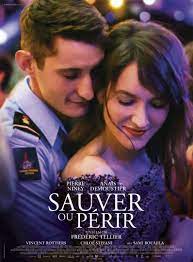
SAUVER OU PERIR/ THROUGH THE FIRE
France, 2018, 116 minutes, Colour.
Pierre Niney, Anais Demoustier, Vincent Rottiers, Sami Bouajila.
Directed by Frederic Telllier.
This French drama is based on a true story – or inspired by a range of true stories.
Pierre Niney, who has made an impact in quite a number of films, plays a dedicated fireman, a family tradition, the film giving details, with a touch of documentary style, of life with the fire brigade, the men, the camaraderie, the training, the loyalty and the playing of the Marseillaise, the demands of action, the repercussions for family.
The film also focuses on the central character, Frank, his courting of his wife, Cecile, the life together, pregnancy and children.
However, the main action takes place during an intense fire, Frank, heroic, willing to give his life for the safety of his unit. He is badly burnt and wakes up in the Burns Unit in a hospital.
The rest of the film is demanding on Franck as he discovers the severe injuries to his face and body, the need for months of treatment, reconstruction, facing the realities of his future. It is demanding on his wife, at his bedside, but discussions about the demands made on her and the family, and the possibilities for their future life together. And, it is quite demanding on the audience, empathising with Frank, dismayed at the extent of his injuries, of his life being so completely altered.
There have been a number of action adventures with explorations of family situation in such fire brigade films as the American Backdraft.
- The title? The French title and the motto for fire departments? Their mission? The English title, the emphasis on fire, on Franck and his experience?
- The Paris settings, the brigade centre, interiors, the courtyard? The fire location? The hospital’s, recuperation? Homes, the streets and the bridges, the Carnival? The musical score? The Marselllaise?
- The introduction, Frank and Cecile, the dancing, the music, Sh-boom, marriage, Cecile pregnant? The devoted couple?
- Franck, his father, working for the brigade, fellow workers, Martin and his accident falling from the roof, sad and resigned? Franck, promotion, in charge?
- The special call, the extent of the fire, the visualising of the fire, Franck and his squad, Franck going in, rescuing the men, on fire, his injuries?
- Franck, the injuries, in hospital, the number of operations, the treatment, colour, recovery, his face masked? The months, the years? His endurance? The severity of the bones, his face? Eventually having to wear the glass protection? Eventually being released? His living in the mirror, his disfigurement? The effect on his personality, unable to go back to his work? The ceremony, his being honoured, his speech?
- Cecile, the children, the demands on her over the years, at her husband’s side, his injuries, the effect on her, looking after the children, becoming more desperate, wondering about her love for her husband?
- Martin, his friendship, support of Franck, Martin reinstated, Franck supporting him?
- The release from hospital, the family gathering, his mother, the relations, his self-consciousness, the meal, having to rest?
- The discussions with Cecile, whether she could stay with him or not, her taking the children? Franck and his decision to win her back?
- His carer, going to the orchestra, asking for the interview, his pleading? Playing the xylophone? The concert, the invitation to Cecile, her not going to the concert?
- Franck and his attempts to reconcile with Cecile, with the children, the gift of the xylophone, her saying they had one? His dressing as the clown, the Indian feathers for Cecile, bonding with his children?
- Cecile and her love and support? His getting the job at reception? The future for Franck, the future for the marriage?
Single All the Way

SINGLE ALL THE WAY
US, 2021, 99 minutes, Colour.
Michael Urie, Philemon Chambers, Luke MacFarlane, Barry Bostwick, Jennifer Robertson, Kathy Najimy, Jennifer Coolidge.
Directed by Michael Mayer.
Single is not a misprint for jingle! Which suggest that this is a Christmas movie – and, indeed it is, with many of the familiar characters, plot devices and developments. It is a story of a family reunion, the different generations, Christmas decorations, Christmas joyfulness, the putting on of a Christmas pageant, discussions about Christmas trees and decorations.
And, the family is quite varied, a rather loud American family presided over by the matriarch of the family, played happily by Kathy Najimy (and memories of Sister Act and Hocus-Pocus) with her more subdued but nonetheless interventionist husband, played by Barry Bostwick (a long time since The Rocky Horror Picture Show). There is a next generation, two sisters and a brother and spouses, as well as the grandchildren generation, two young women, two young boys. Who could ask for anything more! Especially when the eccentric Aunt Sandy arrives in the form of Jennifer Coolidge, doing a variation on her usual performance (or, should that be, audiences enjoying what is her usual performance!)
But, this is a Christmas romantic comedy with quite a difference. The character who is single all the way is gay. He is Peter, Michael Urie, entrepreneur with setting up photo shoots and advertising, but with a great hobby of raising plants, personalising them. He has a sympathetic roommate but not partner, Nick (Philemon Chambers) who writes children’s books about his pet dog and is quite a handyman in all kind of practical jobs.
The trouble is that Peter is prone to break up with partners, the film opening with the disaster when the man of his dreams turns out to be married with children. He is summoned across the country from California to New Hampshire for Christmas, his mother having set up a local gym trainer for a date with ultimate intentions. Peter asks Nick to come with him as a favour, to pretend that they are a couple – but the family instantly sees through this, all liking Nick very much for a long time, and much of the film contriving to persuade Nick that he is in love with Peter. Peter goes on the date, is comfortable and enjoys it, a genial partner (Luke McFarlane) but, of course, eventually realises the truth, and he and Nick are united. Peter wants to return home, Nick spends his royalties from his children’s book on buying a front store for Peter to work with his plants, has already written a sequel to the delight of the boys, despite all problems with preparing the pageant, it is a success all around.
Philemon Chambers as Nick is a sympathetic character – some audiences may find Michael Urie’s Peter too camp and ditzy. The film is PG rated, and, in 2021, taking gay relationships for granted. An easy film for acceptance. No homophobia here.
One Second
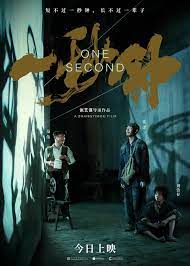
ONE SECOND
China, 2020, 102 minutes, Colour.
Zhang Yi, Haocun Liu, Wei Fan.
Directed by Zhang Yimou.
Audiences were ready to see One Second at the 2019 Berlinale but the film was withdrawn four days before screening, allegedly post-production problems, which most understood as some form of censorship and disagreement with the contents of the film and/or its impact. It was eventually released in China in 2020.
This story of censorship is surprising since the film was cowritten and directed by veteran and acclaimed director, Zhang Yimou (Chief Director of the opening and closing ceremonies of the 2008 Beijing Olympics). He began directing films at age 37 in 1988 with Red Sorghum, making an impact with his drama, history, photographic beauty. This continued during the 1990s, Raise the Red Lantern, Qui Ju, To Live. After the impact of Crouching Tiger, Hidden Dragon, which he admired, he made a great number of spectacular and colourful historical martial arts epics. During the 2010s, he has tackled a variety of themes and styles.
However, in 1999-2000, he made two quietly domestic but very moving smaller films, Not One Less and The Road Home. For this reviewer, they were journeys into China, quieter and emotional journeys, meeting the people, familiar dilemmas and crises. One Second is very much in this vein and all the more welcome for it.
The setting is 1975, the impact of the Cultural Revolution. It is a story of cinema, travelling movie reels to remote rural towns, newsreels and propaganda films like the 1964 Heroic Sons and Daughters, sections of which we see, the audience rapt, having seen the films before, but singing along with the patriotic songs. Zhang Yimou has noted the “collective experience” of these decades (noting that present generations are moving away to more individual experiences).
In many ways, the plot is small. We first see a ragged man walking through the sand dunes (one commentator wryly noting that this is the most desert and sand dunes we see this side of Arrakis!). The individual is so small against the dunes. Who is he? It takes some time for us to find out as he wanders the desert, arriving in the town, too late to see the movie, encountering an orphan girl who steals a reel, pursuing her, recovering the reel and then losing it. So, not only who is he, but what is so important about the reel?
We have some sympathy for the man wandering the desert, clashing with the girl, recovering and losing the reel, getting lifts in trucks, eager to drink from the local tap, hungrily devouring noodles, and people regarding him are suspicious.
So, here we are, in a remote town, the people gathering, eager to watch the film – but a long episode, where a reel has fallen off the back of the cart and lies tangled in dust on the road. The stranger is desperate. The proud local projectionist takes charge and a huge cleaning, communal effort, follows.
And then we discover what the One Second is, a glimpse of film that the stranger eagerly wants to see, desperately wants. And we learn who is one, what his experience has been, what the sequence contains – pathos for him, pathos for us, the audience.
And there is more pathos when we learn who the orphan is, her studious little brother, the custom of making lampshades from film strips and the reason for her stealing the reel. Some bonding between the stranger and the orphan, after some fights, physical, some desperation on his part, some hurt on her part for her brother on hers.
And, then, the film seems to end sadly out there in the dunes. But, in fact, there is an epilogue, two years later, the Cultural Revolution over, prisoners freed, children better clothed and educated, and the stranger and the orphan meeting again, returning to the dunes, memories of sadness but, could we hope, a better future?
- The films of the director over many decades, Chinese history, Chinese mythologies, spectacle, and intimate domestic dramas? The place of One Second?
- The setting, Chinese communes and units, the small towns, the populations, comparatively poor, Socialism, work, community gatherings, film screenings, newsreels, propaganda? The Communist revolution? Chairman Mau? His picture, his principles?
- The period, 1975, the Cultural Revolution, strict socialism, in the aftermath of Chairman Mao, rules and regulations, security guards? The end of the film, a change of regime, prisoners being released, more freedom of movement?
- The towns in the desert? The widescreen visuals of the desert, sands, the continuous dunes, individuals so small within these vast landscapes? The visual background for the film, the action sequences in the desert? The musical score?
- The man, seen alone in the desert, trudging through, up and down the dunes, eventually getting to the town, audiences wondering who he was, his purpose, his appearance, the drab uniform, cap? His age? Dishevelled? Finding the hall for the movies? The end of the screening? The reels, in the bag on the bike? Seeing the orphan, her taking the reel, his pursuit of her, the struggles? Coming back, the bike gone?
- The story of the film reel? The range of adventures? The fight with the girl, then realising she was a girl? Taking the reel, trudging to the next town for the screening? Her following him, the bone and her hitting him? Retrieving the reel? His being picked up by the truck, the conversation, seeing the girl, stopping, in the car, her spinning the story about her father, the suspicions of the driver, trying to get the reel, his getting out of the truck because of the cyclist with the film? The cyclist, difficulties with the bike, riding past, and the man stranded?
- Arriving in the town, getting something to eat, seeing the girl, the interactions in the restaurant, the projectionist, his coming to intervene, the various stories, his suspicions? And the missing reel?
- The people gathering, the eagerness to see the film, the Heroic Sons and Daughters, their having seen the film many times, joining in the singing of the patriotic songs? The projectionist’s son, the later explanation of his drinking the cleaning fluid and having brain damage, helping the cyclist, with the reels of films, falling of the truck, tangling? The crisis?
- The emerging of the reason for the man’s journey, the letter, the story of his daughter being seen in the film? His desperation to see it? And the revelation that he was a prisoner, for six years, his wife divorcing him, his daughter working in the factories, the information that she could be seen in the film?
- The revelation of the title of the film, the one second in which the man could see his daughter?
- The response of the projectionist, the town people, salvaging the film, all the volunteers, the washing of the film, the drying and the fans, the man helping with tangling, the projectionist winding the film?
- The man, the interactions with the orphan, the clashes, the realisation that her story was true, seeing her little brother, his reading, wanting some of the film to make a lampshade, her stealing some of the introductory material, the suspicions of the projectionist? (And the elaborate film lampshade the projectionist had?)
- The story of the bullying of the brother, the man offering to defend, the girl pointing out the group, their bullying tactics, the fight in the hall, bashing the man?
- The man desperate, looking for the girl, looking for the reel of film, going to her house, searching, frightening the boy?
- The irony that she had delivered the film, his watching the film, the audience and the patriotic film, his discovering the girl outside, the truth, her demanding an apology?
- His wanting to see the scene over and over again, the projectionist providing a loop, his sitting in the hall, watching?
- The projectionist, with the security, their coming to get the man, bashing the girl, bashing the man, taking him away? The projectionist giving him the film frames with his daughter? In the dunes, their taking the frames, throwing them away? The girl, following, finding the wrapping and thinking that that was what was lost?
- This sequence as a sad ending for the film?
- The epilogue, two years later, change of government policy, the man being freed, going back to the village, looking for the girl? Her changing appearance? Her finding the page she had saved, neatly folded, giving it to the man, the going out into the dunes, unable to find the frames? Pathos? The future?
